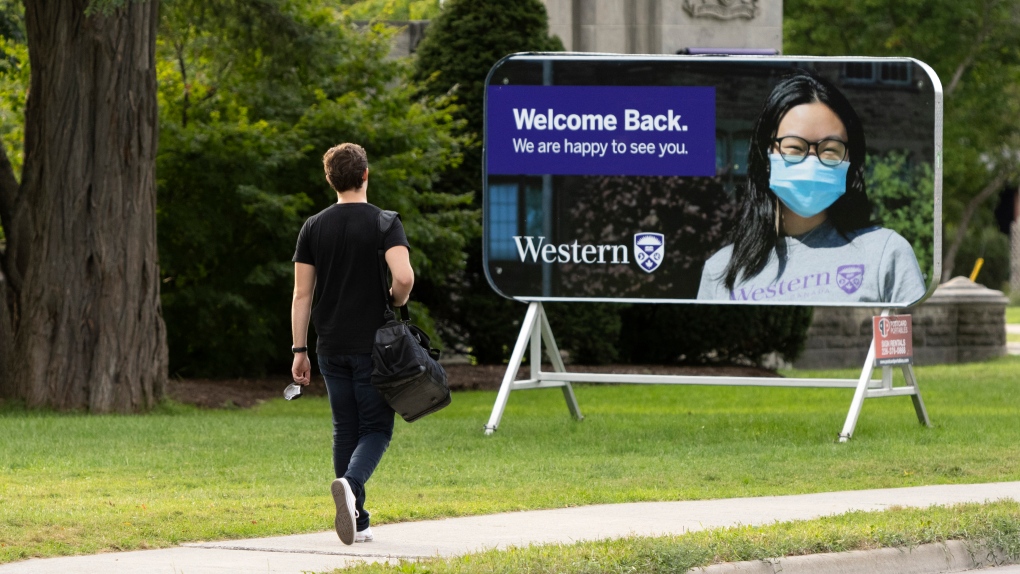Western revokes COVID-19 vaccine policy, mask mandate remains in effect
 A student walks towards the Western University campus in London, Ont. on Wednesday, September 15, 2021. THE CANADIAN PRESS/Nicole Osborne
A student walks towards the Western University campus in London, Ont. on Wednesday, September 15, 2021. THE CANADIAN PRESS/Nicole Osborne
London, Ont.’s Western University will be dropping its COVID-19 vaccination policy, the university announced Tuesday afternoon.
In a statement from Western University, the university has decided to revoke its COVID-19 vaccination policy, and will no longer require students, employees and visitors to be vaccinated in order to come to campus.
Western said it has been dedicated to regularly reviewing its vaccine policy, and therefore the decision was made following consultation with medical experts and local public health authorities.
Despite the change in policy, Western reiterates that “public health guidance remains clear: vaccination continues to be the best defence against severe illness and hospitalization. We strongly encourage everyone to remain up to date on their vaccinations.”
With the fall semester nearing an end, Western thanked its students and faculty for their cooperation.
“Before we enter the busy exam season, we want to thank you for taking care of yourselves, each other, and our community. With your help, Western has minimized the impact of COVID-19 and offered a consistent, positive on-campus experience this term.
Masks however will still be required in instructional spaces for the winter term after the December break.
Medical-grade masks are available for free in libraries and in some of Western’s largest classrooms.
In what was seen as a controversial decision back in August, Western announced the implementation of COVID-19 vaccination and masking policies for the fall semester. This was in contrast to London's Fanshawe College, which did not mandate either for its students and staff.
“Thanks to everyone in our Western community for keeping each other safe,” Western said in a statement. ”We look forward to seeing you back on campus in January and wish you a restful and safe winter break.
CTVNews.ca Top Stories

Lack of detention space could force CBSA to release detainees, internal memo warns
The Canada Border Services Agency is scrambling to find space to hold high-risk detainees that are set to be transferred from provincial jails in June.
BREAKING American millionaire Jonathan Lehrer denied bail after being charged with killing Canadian couple
American millionaire Jonathan Lehrer, one of two men charged in the killings of a Canadian couple in Dominica, has been denied bail.
BREAKING Allman Brothers Band co-founder and legendary guitarist Dickey Betts dies at 80
Guitar legend Dickey Betts, who co-founded the Allman Brothers Band and wrote their biggest hit, 'Ramblin' Man,' has died. He was 80.
Trend Line Anger, pessimism towards federal government reach six-year high: Nanos survey
Most Canadians in March reported feeling angry or pessimistic towards the federal government than at any point in the last six years, according to a survey by Nanos Research.
Police make arrests in grandparent scam that defrauded victims out of $739K
Ontario Provincial Police say they have 'disrupted' an organized crime group that allegedly used an emergency grandparent scam to defraud seniors across Canada out of hundreds of thousands of dollars.
Taylor Swift's new album allegedly 'leaked' on social media and it's causing a frenzy
A Google Drive link allegedly containing 17 tracks that are purportedly from Swift's eagerly awaited "The Tortured Poets Department" album has been making the rounds on the internet in the past day and people are equal parts mad, sad and happy about it.
Motion to allow keffiyehs at Ontario legislature fails
A motion to reverse a ban on the keffiyeh within Queen’s Park failed to receive unanimous consent Thursday just moments after Ontario Premier Doug Ford reiterated his view that prohibiting the garment in the House is divisive.
What does it mean to be 'house poor' and how can you avoid it?
The journey to home ownership can be exciting, but personal finance columnist Christopher Liew warns about the trappings of becoming 'house poor' -- where an overwhelming portion of your income is devoured by housing costs. Liew offers some practical strategies to maintain better financial health while owning a home.
Calgary man charged with manslaughter in death of toddler
Calgary police say Winston Campbell, 45, has been charged in the death of a two-year-old girl in 2022.





























